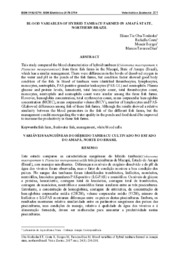Blood variables of hybrid tambacu farmed in Amapá State, Northern Brazil.
Blood variables of hybrid tambacu farmed in Amapá State, Northern Brazil.
Author(s): YOSHIOKA, E. T. O.; COSTA, R.; BORGES, M.; TAVARES-DIAS, M.
Summary: This study compared the blood characteristics of hybrid tambacu (Colossoma macropomum x Piaractus mesopotamicus) from three fish farms in the Macapá, State of Amapa (Brazil), which has a similar management. There were differences in the levels of dissolved oxygen in the water and pH in the ponds of the fish farms, but condition factor showed good body condition of the fish. In blood of tambacu were identified thrombocytes, lymphocytes, monocytes, neutrophils, PAS-positive granular leukocytes (PAS-GL) and eosinophils. Plasma glucose and protein levels, hematocrit, total leucocyte count, total thrombocytes count, monocytes, neutrophils and eosinophils count were similar among the three fish farms. However, hemoglobin concentration, total erythrocytes count, mean corpuscular hemoglobin concentration (MCHC), mean corpuscular volume (MCV), number of lymphocytes and PAS-GLshowed differences among fish of these fish farms. Although the results showed a relative similarity between the blood parameters in the fish of the different fish farms, but the management conditions regarding the water quality in the ponds and food should be improved to increase the productivity in these fish farms.
Publication year: 2017
Types of publication: Journal article
Unit: Embrapa Amapá
Observation
Some of Embrapa's publications are published as ePub files. To read them, use or download one of the following free software options to your computer or mobile device. Android: Google Play Books; IOS: iBooks; Windows and Linux: Calibre.
Access other publications
Access the Agricultural Research Database (BDPA) to consult Embrapa's full library collection and records.
Visit Embrapa Bookstore to purchase books and other publications sold by Embrapa.

